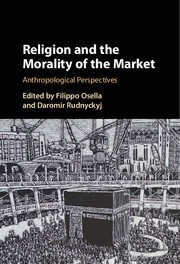Book contents
- Frontmatter
- Dedication
- Contents
- List of Figures
- List of Contributors
- Acknowledgments
- Introduction: Assembling Market and Religious Moralities
- 1 Risk, Fate, Fortune: The Lives and Times of Customs Inspectors in Southern China
- 2 Morality, Markets, and the Gospel of Prosperity
- 3 Religious Myths Retold: Masters and Servants in India's Corporate Culture
- 4 Divine Markets: Ethnographic Notes on Postnationalism and Moral Consumption in India
- 5 Merit Economies in Neoliberal Times: Halal Troubles in Contemporary Sri Lanka
- 6 “Structural Adjustment Islam” and the Religious Economy in Neoliberal Mali
- 7 Assembling Islam and Liberalism: Market Freedom and the Moral Project of Islamic Finance
- 8 Persistent Forms: Catholic Charity Homes and the Limits of Neoliberal Morality
- 9 Marketizing Piety through Charitable Work: Islamic Charities and the Islamization of Middle- Class Families in Indonesia
- 10 “A Poor Muslim Cannot Be a Good Muslim”: Islam, Charitable Giving, and Market Logic in Sri Lanka
- 11 “For God and the Country”: Agricultural Migrations and their Moralities in South India
- 12 “The Globalization of Indifference”: On Pope Francis, Migration and Global Acedia
- Index
- References
Introduction: Assembling Market and Religious Moralities
Published online by Cambridge University Press: 13 April 2017
- Frontmatter
- Dedication
- Contents
- List of Figures
- List of Contributors
- Acknowledgments
- Introduction: Assembling Market and Religious Moralities
- 1 Risk, Fate, Fortune: The Lives and Times of Customs Inspectors in Southern China
- 2 Morality, Markets, and the Gospel of Prosperity
- 3 Religious Myths Retold: Masters and Servants in India's Corporate Culture
- 4 Divine Markets: Ethnographic Notes on Postnationalism and Moral Consumption in India
- 5 Merit Economies in Neoliberal Times: Halal Troubles in Contemporary Sri Lanka
- 6 “Structural Adjustment Islam” and the Religious Economy in Neoliberal Mali
- 7 Assembling Islam and Liberalism: Market Freedom and the Moral Project of Islamic Finance
- 8 Persistent Forms: Catholic Charity Homes and the Limits of Neoliberal Morality
- 9 Marketizing Piety through Charitable Work: Islamic Charities and the Islamization of Middle- Class Families in Indonesia
- 10 “A Poor Muslim Cannot Be a Good Muslim”: Islam, Charitable Giving, and Market Logic in Sri Lanka
- 11 “For God and the Country”: Agricultural Migrations and their Moralities in South India
- 12 “The Globalization of Indifference”: On Pope Francis, Migration and Global Acedia
- Index
- References
Summary
At the end of 2013, the director of mission and public affairs for the Church of England, Malcolm Brown, wrote in the pages of the widely read British liberal newspaper The Observer, “For the first time in a century, the Church of England is speaking about the morality of the marketplace and is not being told that ‘theology has nothing to say to economics, so shut up’” (Brown 2013: 29). Five years after the start of global economic recession, the Church's public intervention is not, however, simply posing religious ethics against the apparent a/immoral working of markets. Rather, “it's the recognition that the market is a brilliant distributional mechanism with great power to adapt and self-correct, provided there is enough moral awareness among the players to prevent the accumulation of overweening monopoly power.” Condemning the tendency of current markets to produce uncompetitive monopolies, Brown suggests that
A better economy need not mean jettisoning the disciplines of the market economy. It does mean recognizing that the market's inbuilt tendency to erode competition damages us all unless held in check. Regulation may be part of a solution, but it contains the ever-present spectre of distributing too much power in the hands of the state. The missing link is one which Adam Smith would have understood – the rediscovery of a moral consensus (he called it mutual sympathy) to mark the limits to markets so that, paradoxically, the market can deliver what people – including those too poor to interest an uncompetitive market – want and need. (ibid.)
Some months before Brown's comments, in a fundraising event organized in 2012 by the Islamic Education and Research Academy, Mr Amir delivered a lecture in Birmingham to a gathering of more than 3,000 people, mostly of Pakistani origin. An Egyptian-Canadian, Mr Amir is a well-known Muslim charity fundraiser, regularly invited by mosques, community organizations and charities to motivate and mobilize potential Muslim donors.
- Type
- Chapter
- Information
- Religion and the Morality of the Market , pp. 1 - 28Publisher: Cambridge University PressPrint publication year: 2017
References
- 2
- Cited by



